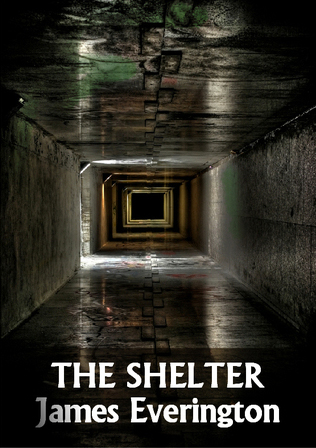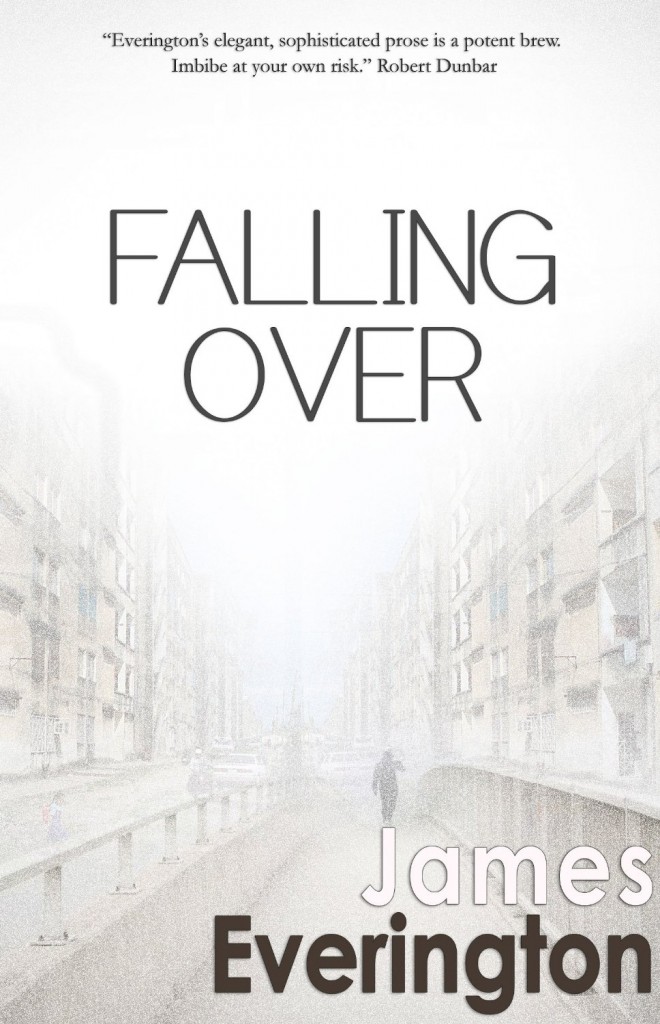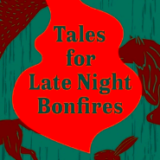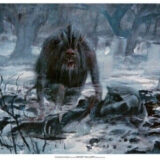James Everington is an up-and-coming British writer of weird horror fiction. To date he has published a novella – The Shelter – and two story collections, The Other Room and Falling Over. his work is dark, introspective and thoughtful. Recently I interviewed him by email.
*
ASM: In your books you tell us something about the origins of your stories along with a few personal details, but for those who haven’t read them could you introduce yourself by telling us a little about your background, where you come from?
 James Everington: Hi. I’m a writer from Nottingham, where I’ve lived most of my life, apart from a few years in Oxford (the contrast between these two places informed my first ever accepted story – ‘Home Time’). To be honest, my background is pretty average and unexciting, as you might guess from someone whose two main passions in life involve spending time alone in my room… (I’m talking about reading and writing, to be clear…) I’m always suspicious about writers with interesting biographies, although envious too, at times like this.
James Everington: Hi. I’m a writer from Nottingham, where I’ve lived most of my life, apart from a few years in Oxford (the contrast between these two places informed my first ever accepted story – ‘Home Time’). To be honest, my background is pretty average and unexciting, as you might guess from someone whose two main passions in life involve spending time alone in my room… (I’m talking about reading and writing, to be clear…) I’m always suspicious about writers with interesting biographies, although envious too, at times like this.
ASM: When did you first know you wanted to be a writer?
James Everington: It was some time in my early teens. Mind you, I wanted a lot of things back then, such as to be able to play guitar or be able to feel confident in a room full of people I’ve never met before. I never achieved either of those, but I’ve stuck with the writing, for better or worse. If people don’t like my stories, I’m perfectly willing to come and show them how much worse my guitar playing is. (But not in a room full of strangers, obviously.)
ASM: Well I’m sure you’re guitar playing is better than mine! How did you go about getting published, and where and when did your first stories appear? Was it a long struggle to get into print, or did it happen relatively quickly?
James Everington: How did I go about getting published? Haphazardly. With little confidence. I started submitting to magazines about four years ago I think and on my third submissions somewhere I had a story picked up by Morpheus Tales which was a a real boost. I had a few other stories published and then started dallying with self-publishing – I didn’t realise some people frowned on that route, I was that badly clued up on things. So The Other Room and The Shelter came out that way, and reader’s reactions provided more confidence-boosting (as I said, I was starting from a pretty low point!)
Then Falling Over was a move away from self-publishing, as it was released by the wonderful Infinity Plus. The reasons why were as much psychological as anything else: for most of my adult life self-publishing wasn’t a ‘thing’ and so the dream was by necessity of being published by someone else. But I did nothing about it, simply because I was scared to. I was afraid what reaction my stories would get out in the big bad world. And I don’t think it can be good for you, psychologically, to have not done something in your life that you wanted to because of fear. So I did it. Fortunately the experience was very positive, both working with Infinity Plus (who put out some great books; I was a fan before I thought of contacting them) and from readers and reviewers after it was published. So much so that my lack of confidence is a thing of the past!
 ASM: The Shelter was published in 2011, and according to your afterword the first draft was started 17 years before that, ‘not long after the events on which it’s based took place’. Is it genuinely based on real events, or is this a writer’s game with the reader? In the afterword you say that while you were rewriting the novella – because the original version was ‘dreadful’ – you did some online research and could find no trace of the real old air raid shelter (if that’s what it was). As if it had vanished from the world, or never existed. But that you insist in the same afterword that the shelter was real. It all reads rather like an extra spooky sting in the tale, and like a homage to Stephen King – the four boys going off in the countryside for an adventure one summer’s day evokes The Body / Stand By Me – and even the afterword, which name-checks King, has a King-like chat-to-the-Constant-Reader quality. So, are you having us on, and if not, what really happened?
ASM: The Shelter was published in 2011, and according to your afterword the first draft was started 17 years before that, ‘not long after the events on which it’s based took place’. Is it genuinely based on real events, or is this a writer’s game with the reader? In the afterword you say that while you were rewriting the novella – because the original version was ‘dreadful’ – you did some online research and could find no trace of the real old air raid shelter (if that’s what it was). As if it had vanished from the world, or never existed. But that you insist in the same afterword that the shelter was real. It all reads rather like an extra spooky sting in the tale, and like a homage to Stephen King – the four boys going off in the countryside for an adventure one summer’s day evokes The Body / Stand By Me – and even the afterword, which name-checks King, has a King-like chat-to-the-Constant-Reader quality. So, are you having us on, and if not, what really happened?
James Everington: Yes, every word of that afterword is true as far as I know. When I was an adolescent four of us did go to the neighbouring village where there was a WW2 shelter (at least, that’s what I was told it was); we managed to get it open and we did play stupid games like shutting each other inside of it… But I’ve never found any trace of it online since, nor am I in touch with the other boys any more to collaborate it that way. It’s the oddest thing. I find your idea that it has vanished from the world very spooky, but I’ve no evidence to show it hasn’t.
Of course, all this is what I would say if I was playing games, isn’t it…?
That said, I take your point that the afterword to The Shelter does continue the tone of the story itself, and it was deliberately written that way. I wouldn’t have included it if it broke the mood. And the Stephen King of The Body and IT was definitely an influence (he writes about childhood so well) as was Dan Simmon’s The Summer Of Night.
 ASM: So we know you wanted to be a writer from your early teens, but did you always know what sort of writer you wanted to be? What were you reading as a teen and who influenced you, along with Stephen King and Dan Simmons? Were you always going to write ‘weird horror fiction’, as the back cover of The Other Room describes the stories, or might you have gone some other direction?
ASM: So we know you wanted to be a writer from your early teens, but did you always know what sort of writer you wanted to be? What were you reading as a teen and who influenced you, along with Stephen King and Dan Simmons? Were you always going to write ‘weird horror fiction’, as the back cover of The Other Room describes the stories, or might you have gone some other direction?
James Everington: Yes, I loved King and Simmons as a teenager, and the discovery of Ramsey Campbell’s short fiction was a real turning point. But I’ve never just read horror; I studied English at university so I was reading a lot of Samuel Beckett, TS Eliot, people like that. I strongly believe writers should read as widely as they can, regardless of what they write. I remember reading Virginia Woolf’s Mrs Dalloway and there’re some scenes in that about a soldier with shell-shock back from the war and he suffers from hallucinations – they made a real impression; there’s so much a horror writer can learn from how she writes about his fears bleeding into his perceptions of the outside world.
So when I started out writing, I wrote a bit of everything: a horrendous Martin Amis-y novel, some very bad poetry, and yes some horror stories too. Because I was still reading horror throughout my student days, discovering people like Shirley Jackson (The Haunting Of Hill House still being one of my favourite books). It took me a good few years to work out that my talent for writing, such as it is, wasn’t as wide as my taste in reading. That’s a valuable lesson, I think.
ASM: Regarding Ramsey Campbell’s fiction as a turning point – you certainly do what he does (and King does as well), which is set your stories in familiar contemporary locations. With King it is Maine, with Campbell, Liverpool. Your characters generally inhabit a rather bleak version of modern Britain – one of students living in damp shared houses, or young people working thanklessly as temps, often about to lose their job, struggling to get on the housing ladder – and the often surreal circumstances they encounter both reflect their own failings and sometimes serve as a metaphor for social or political ills. For instance, taking a couple of stories from The Other Room, ‘First Time Buyers’ suggests that those who end up at the bottom of the economic system literarily lose their voice, while ‘When The Walls Bend’, as well as being a chilling tale of psychological disintegration – and perhaps a subtle vampire story – takes a hard look at the human cost of the international sex trade. Is a good writer necessarily to some extent a ‘political’ writer? Of course other stories, such as ‘Schrodinger’s Box’ and ‘A Writer’s Words’ fuse their horror elements with more purely interior concerns…
James Everington: That’s an interesting question; I certainly think horror fiction can take the weight of various external and internal concerns, and I think it’s ideally suited for exploring some of them – the nature of perception, or how we treat people as outsiders, for example. But I’m not sure I ever start a story with such hifalutin concepts in mind, it’s normally something more basic and genre-related – for example, the initial inspiration for one of the stories you mentioned, ‘First Time Buyers’, was that I wanted to write a ghost story set in a new-build house i.e. one without the traditional haunted house history. As I wrote and rewrote it the ‘ghost’ turned into a more physical being, and some of the metaphoric elements you picked up on became clear to me and I tried to dovetail them into the plot. But I’m not sure I’d have been successful if I started by trying to write a story about the effects of the economic downturn on people’s relationships or whatever.
ASM: So would it be fair to say your stories generally start with an idea or situation and develop from there?
James Everington: Yes, although it can be a quite vague idea or even just a first line. It’s just something I have a feeling about, that seems greater than the sum of its parts… Sorry if that sounds vague! I certainly don’t need to have planned out the plot or anything before I start; it’s normally a case of having enough to get started and then seeing what develops. Ideas come a lot more easily when I am actually writing, rather than sitting around thinking about starting to write…
ASM: I’ve read The Shelter and both your published collections, The Other Room and Falling Over. Although all ‘horror’ or weird fiction, they contain quite a diverse range of fiction. Could you pick a couple of the stories that you think worked particularly well and perhaps talk us through them a little bit, explain why people might want to read them?
James Everington: I’m glad you think they’re diverse, because I often worry I’m a one-trick pony (and that it’s not a very good trick, at that). But anyway. I’m not quite sure if the stories I’ll mention are my ‘best’ in an objective sense, but they are ones that maybe sum up my work to a degree.
Firstly, the title story in The Other Room. It’s about a man staying in some anonymous chain hotel on business, and he finds that his room-card actually lets him open two rooms in the hotel – his room and the one next door, which is the mirror-image of his own. And he soon realises that if he steps out of the other room it’s not into quite the same world as if he steps out of his own… I chose it as the title story for the collection because I felt the phrase summed up the contents well; perhaps hinting that all of the oddities in the other stories take place in a world not quite our own. That’s what interests me in writing weird fiction, that undefinable sense that something is askew, that the world around is not quite as it should be… Creating that atmosphere is one of my main aims when writing.
 Then maybe ‘Drones’ in Falling Over – this one is more a overtly ‘political’ story, and hopefully it’s moral challenge is clear even if the events it describes are more ambiguous. It’s about a remote-drone operator in a foreign war; it’s not an anti-war story as such, but it is anti the desensitised relationship people who agitate for war have with its realities. It uses the metaphor of modern technology and screens for this, but I don’t see it as just referring to modern wars – think of all the politicians and old fat generals sending young men over the top exactly one hundred years ago. But ‘Drones’ is also almost a ghost story, a modern, technological take on the ‘is it real or all in his head?’ type of story.
Then maybe ‘Drones’ in Falling Over – this one is more a overtly ‘political’ story, and hopefully it’s moral challenge is clear even if the events it describes are more ambiguous. It’s about a remote-drone operator in a foreign war; it’s not an anti-war story as such, but it is anti the desensitised relationship people who agitate for war have with its realities. It uses the metaphor of modern technology and screens for this, but I don’t see it as just referring to modern wars – think of all the politicians and old fat generals sending young men over the top exactly one hundred years ago. But ‘Drones’ is also almost a ghost story, a modern, technological take on the ‘is it real or all in his head?’ type of story.
ASM: I do think those are two of your best stories so far. ‘That undefinable sense that something is askew, that the world around is not quite as it should be…’ – that’s a classic sensibility of some of the finest horror writing. But one that often seems to work best in short story form, whereas the market really prefers novels. For instance I know you are a big fan of Robert Aickman, who wrote wonderfully uncanny short stories which capture that undefinable sense… So I’m wondering what next – will you continue to work exclusively at shorter lengths, or are there novels on the horizon?
James Everington: It’s true, I do think horror fiction works particularly well in the short story form. Aickman of course almost exclusively wrote short stories, and I find it hard to think of more than a couple of great horror writers who aren’t also talented short story writers. Obviously there are some fantastic horror novels out there, but generally if I am looking to try a writer new to me, it’s their short story collection I’ll try first.
So I can’t foresee a time when I’ll not be writing short stories, but that’s not to say I don’t want to write novels as well at some point. What I am working on at the moment is a novella called ‘Other People’s Ghosts’, which certainly feels closer to writing a novel than a short story in terms of the number of characters, the structure etc.
*
You may also be interested in reading my review of James Everington’s Falling Over, which contains the excellent ‘Drones’, mentioned in the interview above.










2 Comments